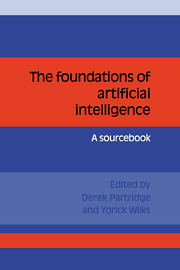Book contents
- Frontmatter
- Contents
- List of contributors
- Preface
- Acknowledgments
- 1 Introduction
- What is AI anyway?
- What kind of information processing is intelligence?
- 2 The formal foundations of AI
- 3 Levels of theory
- 4 Programs and theories
- 5 The role of representations
- 6 The role of programs in AI
- 7 Rational reconstruction as an AI methodology
- 8 Is AI special in regard to its methodology?
- 9 Does connectionism provide a new paradigm for AI?
- 10 The role of correctness in AI
- 11 Limitations on current AI technology
- 12 Annotated bibliography on the foundations of AI
- Index of names
What is AI anyway?
Published online by Cambridge University Press: 03 May 2010
- Frontmatter
- Contents
- List of contributors
- Preface
- Acknowledgments
- 1 Introduction
- What is AI anyway?
- What kind of information processing is intelligence?
- 2 The formal foundations of AI
- 3 Levels of theory
- 4 Programs and theories
- 5 The role of representations
- 6 The role of programs in AI
- 7 Rational reconstruction as an AI methodology
- 8 Is AI special in regard to its methodology?
- 9 Does connectionism provide a new paradigm for AI?
- 10 The role of correctness in AI
- 11 Limitations on current AI technology
- 12 Annotated bibliography on the foundations of AI
- Index of names
Summary
Artificial intelligence is a subject that, due to the massive, often quite unintelligible, publicity that it gets, is nearly completely misunderstood by people outside the field. Even AIs practitioners are somewhat confused with respect to what AI is really about.
Is AI mathematics? A great many AI researchers believe strongly that knowledge representations used in AI programs must conform to previously established formalisms and logics or else the field will be unprincipled and ad hoc. Many AI researchers believe that they know how the answer will turn out before they have figured out what exactly the questions are. They know that some mathematical formalism or other must be the best way to express the contents of the knowledge that people have. Thus, to them, AI is an exercise in the search for the proper formalisms to use in representing knowledge.
Is AI software engineering? A great many AI practitioners seem to think so. If you can put knowledge into a program, then that program must be an AI program. This conception of AI, derived as it is from much of the work going on in industry in expert systems, has served to confuse AI people tremendously about what the correct focus of AI ought to be, and about what the fundamental issues in AI are.
- Type
- Chapter
- Information
- The Foundations of Artificial IntelligenceA Sourcebook, pp. 3 - 13Publisher: Cambridge University PressPrint publication year: 1990
- 9
- Cited by

